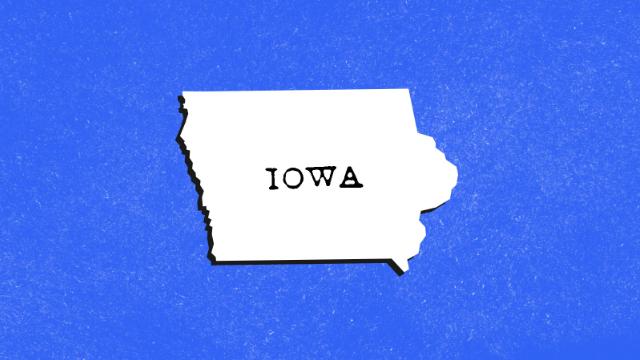January 12, 2020 | by Chris Cillizza Welcome to 2020! With just 22 days until the Iowa caucuses, the 2020 election will be here before you know it. Every Sunday, I deliver to your inbox the 5 BIG storylines you need to know to understand the upcoming week on the campaign trail. And they're ranked -- so the No. 1 story is the most important of the coming week.
Tell your friends to subscribe to The Point newsletter here!
Why 2nd choice matters so much in Iowa  5. Nevada, Nevada, Nevada: Quick, name the first four states in the Democratic nomination fight. Well, there's Iowa (February 3) and New Hampshire (February 11), obviously. And then South Carolina (February 29), of course.
That's three. The fourth state will vote in the Nevada caucuses, set for February 22. Nevada often gets forgotten amid the focus on the other three, but in 2020 at least, it seems poised to play an influential role in the process.
Why? Because there's a very big gap of 18 days between the New Hampshire and South Carolina primaries. For that 11 days after New Hampshire, Nevada will be the big focus -- as candidates seek to use it to either keep up momentum built in the first two states, or to find some before it's too late.
Thanks to a new Fox News poll released late last week, we have a pretty good sense of the state of play at the moment in Nevada. Former Vice President Joe Biden takes first with 23%, followed by Vermont Sen. Bernie Sanders at 17%. Massachusetts Sen. Elizabeth Warren and billionaire businessman Tom Steyer take 12%. (Steyer!) Former Mayor Pete Buttigieg gets 6% and businessman Andrew Yang 4%.
And we know that what happens in Iowa and New Hampshire can (and likely will) have some effect on where Nevada stands when the nation's attention turns there.
But make no mistake: No matter what happens in those first two states, Nevada matters this time around.
4. Do endorsements matter at all?: I've long been a skeptic that endorsements from politicians have any major effect on voters. But the rapidly approaching Iowa caucuses will give a real-time chance to test how much endorsements matter.
On Sunday, Iowa Democratic Rep. Dave Loebsack endorsed Buttigieg's presidential campaign, calling the former South Bend mayor "the candidate that can heal our divides, restore decency to the presidency and bring this country together."
Earlier this year, Iowa Democratic Rep. Abby Finkenauer, who was elected to the House in 2018, endorsed Biden's campaign. (Biden has also been endorsed by former Iowa Gov. Tom Vilsack and his wife, Christie.) Only Rep. Cindy Axne has stayed on the sidelines among congressional Democrats in the state.
The question is this: Do Loebsack or Finkenauer have turnout operations in their congressional districts that help ensure Buttigieg or Biden supporters get to the polls? Do the Vilsacks?
If not, then all these endorsements mean is a positive news story on the local news. Which isn't nothing but isn't all that much.
3. Liberal-on-liberal fights: Since the start of this campaign, Sanders and Warren have played nice with one another.
Political reality always dictated that kumbaya view wouldn't last -- since both candidates are trying to consolidate liberals behind their candidacy.
Sanders appears to have broken that pact, with Politico reporting that the Vermont senator's campaign is circulating talking points to supporters and surrogates that claim that Warren is the candidate of "highly-educated, more affluent people" -- aka the elites.
The Sanders camp is also making the case that Warren voters will be with the party no matter who the nominee is while his voters -- younger, more working class -- might not show up if the Vermont senator isn't the nominee.
Now, putting an attack in talking points isn't the same as putting in on TV. (Or attacking in a debate -- more on that below!) But it suggests Sanders recognizes that his path to the nomination requires drawing contrasts with Warren.
2. Here's your debate primer: The last debate before the Iowa caucuses is set for Tuesday night at 9 p.m. Eastern on your favorite network. (That's CNN, if you were wondering!)
With just six candidates, this will be the smallest debate stage since the race began. And if not for rich guy/businessman Steyer's last-minute qualification -- literally on the day before the deadline -- we would have only had Biden, Sanders, Warren, Buttigieg and Minnesota Sen. Amy Klobuchar on stage.
What to watch for? Do Sanders and Warren clash? Does Buttigieg stay as aggressive against, well, everyone as he's been? Is Biden just trying not to make a big mistake or does he try to play offense? Can Klobuchar find the moment (again) that she will need to close the gap with the frontrunners? Will Steyer wear that same flannel tie? Will anyone on stage complain about party rules that have resulted in no non-white candidates making the stage?
1. Race for second choice in Iowa: By now, you've likely seen the new CNN-Des Moines Register poll out of Iowa; it's a statistical four-way tie between Sanders (20%), Warren (17%), Buttigieg (16%) and Biden (15%).
What you might have missed -- but shouldn't -- is what the numbers look like when you combine voters' first and second choices. When you do that, here's what the numbers look like: Warren 33%, Sanders 32%, Buttigieg 31% and Biden 27%.
Why does second choice matter? Because this is a caucus, not a primary. If your preferred candidate -- and there are still more than a dozen Democrats running -- doesn't get 15% support in any individual caucus in the state, then he or she isn't considered viable and you will be asked to choose another candidate.
And, according to CNN's Harry Enten, of the 1 in 5 people in the CNN poll who currently support a candidate below that viability threshold, Biden takes 19%, Buttigieg 18%, Warren 13% and Sanders 11%. Of the 1 in 3 voters who either a) don't support a candidate about the viability line or b) haven't picked a candidate, here's how favorably they view the top-tier candidates: Buttigieg 55%, Biden 53%, Warren 43% and Sanders 41%.
So, the second choice matters. A lot. In fact, who people make their preferred second choice could make the difference between winning and losing in the caucuses on February 3. 
You are receiving this message because you subscribed to CNN's The Point with Chris Cillizza newsletter. Was this email forwarded to you? Sign up now to get The Point in your inbox. Send your tips and thoughts via email to Chris Cillizza and Lauren Dezenski. You can follow Chris and Lauren on Twitter and connect with The Point on:
Our mailing address is: Copyright © 2020 Cable News Network, Inc., All rights reserved. |
Sunday, January 12, 2020
The Point: Why 2nd choice matters so much in Iowa
Subscribe to:
Post Comments (Atom)




No comments:
Post a Comment